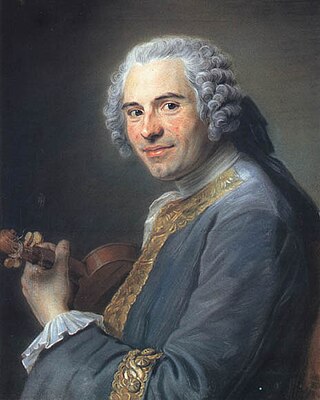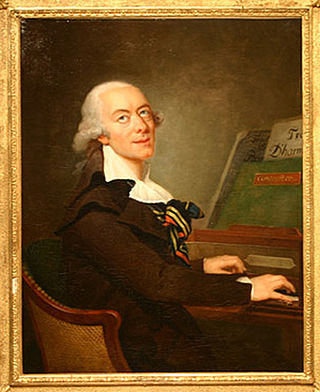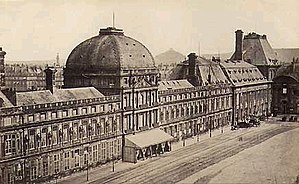
Antoine Houdar de la Motte was a French author.

Michel Richard Delalande [de Lalande] was a French Baroque composer and organist who was in the service of King Louis XIV. He was one of the most important composers of grands motets. He also wrote orchestral suites known as Simphonies pour les Soupers du Roy and ballets.
Antoine Dauvergne was a French composer and violinist.
Jean-Joseph Mouret was a French composer whose dramatic works made him one of the leading exponents of Baroque music in his country. Even though most of his works are rarely performed, Mouret's name survives today thanks to the popularity of the Fanfare-Rondeau from his first Suite de symphonies, which has been adopted as the signature tune of the PBS program Masterpiece and is a popular musical choice in many modern weddings.

André Cardinal Destouches was a French composer best known for the opéra-balletLes élémens.

Henri Desmarets was a French composer of the Baroque period primarily known for his stage works, although he also composed sacred music as well as secular cantatas, songs and instrumental works.

Jean-Joseph de Mondonville, also known as Jean-Joseph Cassanéa de Mondonville, was a French violinist and composer. He was a younger contemporary of Jean-Philippe Rameau and enjoyed great success in his day. Pierre-Louis Daquin claimed, "If I couldn't be Rameau, there's no one I would rather be than Mondonville".
Anne Danican Philidor was a French woodwind player and composer of the Philidor family. Born in Paris on 11 April 1681, his grandfather and father were also professional woodwind players in the king's service. Anne was named for his godfather Anne Jules de Noailles. His composition "L'Amour vainqueur" was given a court performance in 1697, financially backed by his godfather. 1702 saw him succeed his father in the king's orchestra, primarily as oboist. In addition to his playing duties he was the king's musical librarian. He assembled several hundred portfolios of music, both instrumental and operatic, several of which are well-preserved in French libraries. Anne is best remembered today for having founded the Concert Spirituel, an important series of public concerts held in the palace of the Tuileries from 1725 to 1791.

Joseph Legros, often also spelt Le Gros, was a French singer and composer of the 18th century. He is best remembered for his association with the composer Christoph Willibald Gluck and is usually regarded as the most prominent haute-contre of his generation, though his acting is reputed to have been mediocre.
Jacques Aubert, also known as Jacques Aubert le Vieux, was a French composer and violinist of the Baroque period. From 1727 to 1746, he was a member of the Vingt-quatre Violons du Roy; from 1728 to 1752, he was the first violinist with the Paris Opera orchestra; and from 1729 to 1740, he frequently and successfully appeared as a soloist with the Concert Spirituel, performing, among other works, concertos for violin and orchestra of his own composition.
Hervé Niquet is a French conductor, harpsichordist, tenor, and the director of Le Concert Spirituel, specializing in French Baroque music.

Les Élémens, or Ballet des élémens, is an opéra-ballet by the French composers André Cardinal Destouches and Michel Richard Delalande. It has a prologue and four entrées. The libretto was written by Pierre-Charles Roy. It was styled "the third ballet danced by the king" because the 11-year-old Louis XV performed dance divertissements in it, as he had already done in the previous ballets, L'inconnu by various authors, and Les folies de Cardenio by Delalande, both staged at court in 1720.
The chapelle royale was the musical establishment attached to the royal chapel of the French kings. The term may also be applied to the chapel buildings, the Chapelle royale de Versailles.
Élisabeth de Haulteterre (Hotteterre) was a French composer and violinist. Despite the similarity of the name, she did not come from La Couture, the home of the Hotteterre family including Jacques Martin Hotteterre, and is probably not related. She should also not be confused with Élisabeth de Haulteterre (1738-1820) a french musician of the same name.
The grand motet was a genre of motet cultivated at the height of the French baroque, although the term dates from later French usage. At the time, due to the stylistic feature of employing two alternating choirs, the works were typically described as motet pour deux choeurs - motet for double choir.
Le Concert Spirituel is a French ensemble specialising in works of baroque music, played on period instruments. Founded by Hervé Niquet in 1987, it is named after the 18th-century concert series Concert Spirituel. The group performs internationally, playing mostly rarely performed sacred music and operas, and making recordings. Its focus is on French music played at the court of Versailles.

Honoré François Marie Langlé (1741–1807) was a French theorist of music of Monegasque origin, composer, and author of a Traité d'harmonie et de modulation. Napoleon named him to the newly founded Paris Conservatoire.

Thémistocle (Themistocles) is an opera by the French composer François-André Danican Philidor, first performed at Fontainebleau on 13 October 1785. It transferred to the Académie Royale de Musique, Paris on 23 May 1786. It takes the form of a tragédie lyrique in three acts. The libretto, by Étienne Morel de Chédeville, is based on the life of the ancient Greek statesman Themistocles.

Louis-Augustin Richer was a French singer, singing professor and composer. He was a member of a family of musicians from Versailles who also had close ties to the family of André Danican Philidor. He gained prominence as a singer at the courts of Louis XV and Louis XVI and also served as Maître de musique for the courts of the Duke of Chartres and the Duke of Bourbon. After the abolition of the monarchy during the French Revolution, Richer became a professor at the Paris Conservatory.
Marie-Jeanne Larrivée, born Marie-Jeanne Lemière was a French soprano.











